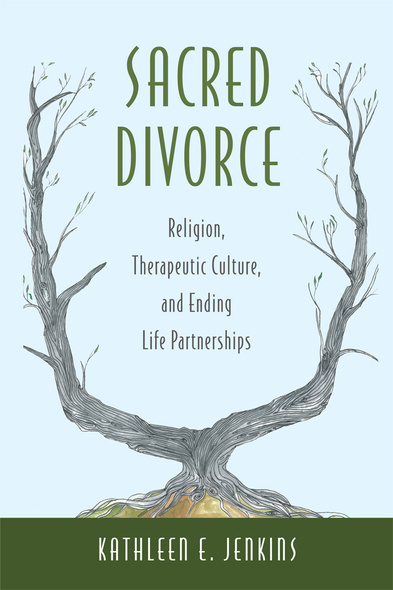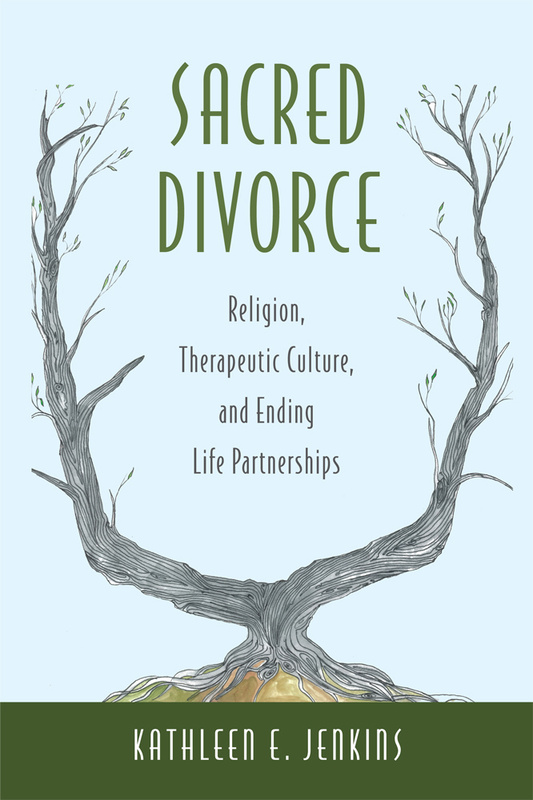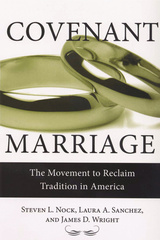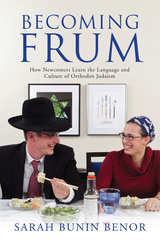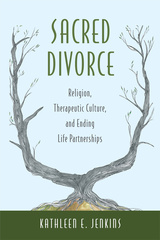Sacred Divorce
Religion, Therapeutic Culture, and Ending Life Partnerships
Rutgers University Press
Even in our world of redefined life partnerships and living arrangements, most marriages begin through sacred ritual connected to a religious tradition. But if marriage rituals affirm deeply held religious and secular values in the presence of clergy, family, and community, where does divorce, which severs so many of these sacred bonds, fit in? Sociologist Kathleen Jenkins takes up this question in a work that offers both a broad, analytical perspective and a uniquely intimate view of the role of religion in ending marriages.
For more than five years, Jenkins observed religious support groups and workshops for the divorced and interviewed religious practitioners in the midst of divorces, along with clergy members who advised them. Her findings appear here in the form of eloquent and revealing stories about individuals managing emotions in ways that make divorce a meaningful, even sacred process. Clergy from mainline Protestant denominations to Baptist churches, Jewish congregations, Unitarian fellowships, and Catholic parishes talk about the concealed nature of divorce in their congregations. Sacred Divorce describes their cautious attempts to overcome such barriers, and to assemble meaningful symbols and practices for members by becoming compassionate listeners, delivering careful sermons, refitting existing practices like Catholic annulments and Jewish divorce documents (gets), and constructing new rituals.
With attention to religious, ethnic, and class variations, covering age groups from early thirties to mid-sixties and separations of only a few months to up to twenty years, Sacred Divorce offers remarkable insight into individual and cultural responses to divorce and the social emotions and spiritual strategies that the clergy and the faithful employ to find meaning in the breach. At once a sociological document, an ethnographic analysis, and testament of personal experience, Sacred Divorce provides guidance, strategies and answers to readers looking for answers and those looking to heal.
For more than five years, Jenkins observed religious support groups and workshops for the divorced and interviewed religious practitioners in the midst of divorces, along with clergy members who advised them. Her findings appear here in the form of eloquent and revealing stories about individuals managing emotions in ways that make divorce a meaningful, even sacred process. Clergy from mainline Protestant denominations to Baptist churches, Jewish congregations, Unitarian fellowships, and Catholic parishes talk about the concealed nature of divorce in their congregations. Sacred Divorce describes their cautious attempts to overcome such barriers, and to assemble meaningful symbols and practices for members by becoming compassionate listeners, delivering careful sermons, refitting existing practices like Catholic annulments and Jewish divorce documents (gets), and constructing new rituals.
With attention to religious, ethnic, and class variations, covering age groups from early thirties to mid-sixties and separations of only a few months to up to twenty years, Sacred Divorce offers remarkable insight into individual and cultural responses to divorce and the social emotions and spiritual strategies that the clergy and the faithful employ to find meaning in the breach. At once a sociological document, an ethnographic analysis, and testament of personal experience, Sacred Divorce provides guidance, strategies and answers to readers looking for answers and those looking to heal.
In reading Sacred Divorce, one is so moved by an astounding number of beautifully written sentences and gripping quotes that one feels one has gone through divorce, therapy, recovery and healing.
A thoughtful and smart examination of how religious communities shape the emotion work involved in ending intimate life partnerships, this well-researched ethnography illuminates the therapeutic turn in contemporary American religion and expands our understanding of the religion-family interface.
Jenkins artfully constructs a powerful analysis of how contemporary divorce experiences are transformed from potentially shaming events into opportunities for spiritual growth that are imbued with sacred meanings.
Sacred Divorce offers a remarkable work of cultural sociology that reveals how religious efforts to sacralize divorce reflect broader cultural tensions about individualism within religion and marriage.
KATHLEEN E. JENKINS is an associate professor and chair of the department of sociology at the College of William and Mary. She is the author of Awesome Families: The Promise of Healing Relationships in the International Churches of Christ (Rutgers).
Acknowledgments
Introduction
Chapter 1 Social Shame and Religious Tools
Chapter 2 Divorce Work as Cultural Strategy
Chapter 3 Solitary Work Through Community
Chapter 4 Cautious Clergy
Chapter 5 Rich Lived Practice
Chapter 6 Religious Emotion and Multiple Family Forms
Appendix on Methods
Notes
References
Index

